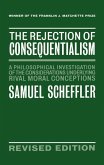- Broschiertes Buch
- Merkliste
- Auf die Merkliste
- Bewerten Bewerten
- Teilen
- Produkt teilen
- Produkterinnerung
- Produkterinnerung
Commonsense Consequentialism is a book about morality, rationality, and the interconnections between the two. In it, Douglas W. Portmore defends a version of consequentialism that both comports with our commonsense moral intuitions and shares with other consequentialist theories the same compelling teleological conception of practical reasons.
Andere Kunden interessierten sich auch für
![Commonsense Consequentialism Commonsense Consequentialism]() Douglas W PortmoreCommonsense Consequentialism206,99 €
Douglas W PortmoreCommonsense Consequentialism206,99 €![Normative Ethics Normative Ethics]() Shelly KaganNormative Ethics196,99 €
Shelly KaganNormative Ethics196,99 €![Consequentialism Consequentialism]() Consequentialism144,99 €
Consequentialism144,99 €![Consequentialism and Environmental Ethics Consequentialism and Environmental Ethics]() Consequentialism and Environmental Ethics67,99 €
Consequentialism and Environmental Ethics67,99 €![The Dimensions of Consequentialism The Dimensions of Consequentialism]() Martin PetersonThe Dimensions of Consequentialism38,99 €
Martin PetersonThe Dimensions of Consequentialism38,99 €![Consequentialism Consequentialism]() Julia DriverConsequentialism36,99 €
Julia DriverConsequentialism36,99 €![The Rejection of Consequentialism The Rejection of Consequentialism]() Samuel SchefflerThe Rejection of Consequentialism83,99 €
Samuel SchefflerThe Rejection of Consequentialism83,99 €-
-
-
Commonsense Consequentialism is a book about morality, rationality, and the interconnections between the two. In it, Douglas W. Portmore defends a version of consequentialism that both comports with our commonsense moral intuitions and shares with other consequentialist theories the same compelling teleological conception of practical reasons.
Hinweis: Dieser Artikel kann nur an eine deutsche Lieferadresse ausgeliefert werden.
Hinweis: Dieser Artikel kann nur an eine deutsche Lieferadresse ausgeliefert werden.
Produktdetails
- Produktdetails
- Verlag: Oxford University Press
- Seitenzahl: 288
- Erscheinungstermin: 1. Juli 2014
- Englisch
- Abmessung: 234mm x 156mm x 17mm
- Gewicht: 494g
- ISBN-13: 9780199396450
- ISBN-10: 0199396450
- Artikelnr.: 40544199
- Herstellerkennzeichnung
- Libri GmbH
- Europaallee 1
- 36244 Bad Hersfeld
- gpsr@libri.de
- Verlag: Oxford University Press
- Seitenzahl: 288
- Erscheinungstermin: 1. Juli 2014
- Englisch
- Abmessung: 234mm x 156mm x 17mm
- Gewicht: 494g
- ISBN-13: 9780199396450
- ISBN-10: 0199396450
- Artikelnr.: 40544199
- Herstellerkennzeichnung
- Libri GmbH
- Europaallee 1
- 36244 Bad Hersfeld
- gpsr@libri.de
Douglas W. Portmore is Associate Professor of Philosophy at Arizona State University. His research focuses mainly on morality, rationality, and the interconnections between the two, but he also writes on wellbeing, posthumous harm, and the nonidentity problem.
* 1. Why I Am Not a Utilitarian
* 1.1 Utilitarianism: The good, the bad, and the ugly
* 1.2 The plan for the rest of the book
* 1.3 My aims
* 1.4 Objective oughts and objective reasons
* 1.5 Conventions that I will follow throughout the book
* 2. Consequentialism and Moral Rationalism
* 2.1 The too-demanding objection: How moral rationalism leads us to
reject utilitarianism
* 2.2 The argument against utilitarianism from moral rationalism
* 2.3 How moral rationalism compels us to accept consequentialism
* 2.4 What is consequentialism?
* 2.5 The presumptive case for moral rationalism
* 2.6 Some concluding remarks
* 3. The Teleological Conception of Practical Reasons
* 3.1 Getting clear on what the view is
* 3.2 Clearing up some misconceptions about the view
* 3.3 Scanlon's putative counterexamples to the view
* 3.4 Arguments for the view
* 4. Consequentializing Commonsense Morality
* 4.1 How to consequentialize
* 4.2 The deontic equivalence thesis
* 4.3 Beyond the deontic equivalence thesis: How consequentialist
theories can do a better job of accounting for our considered moral
convictions than even some nonconsequentialist theories can
* 4.4 The implications of the deontic equivalence thesis
* 4.5 An objection
* 5. Dual-Ranking Act-Consequentialism: Reasons, Morality, and
Overridingness
* 5.1 Some quick clarifications
* 5.2 Moral reasons, overridingness, and agent-centered options
* 5.3 Moral reasons, overridingness, and supererogation
* 5.4 A meta-criterion of rightness and how it leads us to adopt
dual-ranking act-consequentialism
* 5.5 Norcross's objection
* 5.6 Splawn's objection
* 5.7 Violations of the transitivity and independence axioms
* 6. Imperfect Reasons and Rational Options
* 6.1 Kagan's objection: Are we sacrificing rational options to get
moral options?
* 6.2 Imperfect reasons and rational options
* 6.3 Securitism
* 6.4 Securitism and the basic belief
* 6.5 Securitism's suppositions and implications
* 7. Commonsense Consequentialism
* 7.1 The best version of act-utilitarianism: commonsense
utilitarianism
* 7.2 Securitist consequentialism and the argument for it
* 7.3 Commonsense consequentialism and how it compares with traditional
act-consequentialism
* 7.4 What has been shown and what remains to be shown
* 1.1 Utilitarianism: The good, the bad, and the ugly
* 1.2 The plan for the rest of the book
* 1.3 My aims
* 1.4 Objective oughts and objective reasons
* 1.5 Conventions that I will follow throughout the book
* 2. Consequentialism and Moral Rationalism
* 2.1 The too-demanding objection: How moral rationalism leads us to
reject utilitarianism
* 2.2 The argument against utilitarianism from moral rationalism
* 2.3 How moral rationalism compels us to accept consequentialism
* 2.4 What is consequentialism?
* 2.5 The presumptive case for moral rationalism
* 2.6 Some concluding remarks
* 3. The Teleological Conception of Practical Reasons
* 3.1 Getting clear on what the view is
* 3.2 Clearing up some misconceptions about the view
* 3.3 Scanlon's putative counterexamples to the view
* 3.4 Arguments for the view
* 4. Consequentializing Commonsense Morality
* 4.1 How to consequentialize
* 4.2 The deontic equivalence thesis
* 4.3 Beyond the deontic equivalence thesis: How consequentialist
theories can do a better job of accounting for our considered moral
convictions than even some nonconsequentialist theories can
* 4.4 The implications of the deontic equivalence thesis
* 4.5 An objection
* 5. Dual-Ranking Act-Consequentialism: Reasons, Morality, and
Overridingness
* 5.1 Some quick clarifications
* 5.2 Moral reasons, overridingness, and agent-centered options
* 5.3 Moral reasons, overridingness, and supererogation
* 5.4 A meta-criterion of rightness and how it leads us to adopt
dual-ranking act-consequentialism
* 5.5 Norcross's objection
* 5.6 Splawn's objection
* 5.7 Violations of the transitivity and independence axioms
* 6. Imperfect Reasons and Rational Options
* 6.1 Kagan's objection: Are we sacrificing rational options to get
moral options?
* 6.2 Imperfect reasons and rational options
* 6.3 Securitism
* 6.4 Securitism and the basic belief
* 6.5 Securitism's suppositions and implications
* 7. Commonsense Consequentialism
* 7.1 The best version of act-utilitarianism: commonsense
utilitarianism
* 7.2 Securitist consequentialism and the argument for it
* 7.3 Commonsense consequentialism and how it compares with traditional
act-consequentialism
* 7.4 What has been shown and what remains to be shown
* 1. Why I Am Not a Utilitarian
* 1.1 Utilitarianism: The good, the bad, and the ugly
* 1.2 The plan for the rest of the book
* 1.3 My aims
* 1.4 Objective oughts and objective reasons
* 1.5 Conventions that I will follow throughout the book
* 2. Consequentialism and Moral Rationalism
* 2.1 The too-demanding objection: How moral rationalism leads us to
reject utilitarianism
* 2.2 The argument against utilitarianism from moral rationalism
* 2.3 How moral rationalism compels us to accept consequentialism
* 2.4 What is consequentialism?
* 2.5 The presumptive case for moral rationalism
* 2.6 Some concluding remarks
* 3. The Teleological Conception of Practical Reasons
* 3.1 Getting clear on what the view is
* 3.2 Clearing up some misconceptions about the view
* 3.3 Scanlon's putative counterexamples to the view
* 3.4 Arguments for the view
* 4. Consequentializing Commonsense Morality
* 4.1 How to consequentialize
* 4.2 The deontic equivalence thesis
* 4.3 Beyond the deontic equivalence thesis: How consequentialist
theories can do a better job of accounting for our considered moral
convictions than even some nonconsequentialist theories can
* 4.4 The implications of the deontic equivalence thesis
* 4.5 An objection
* 5. Dual-Ranking Act-Consequentialism: Reasons, Morality, and
Overridingness
* 5.1 Some quick clarifications
* 5.2 Moral reasons, overridingness, and agent-centered options
* 5.3 Moral reasons, overridingness, and supererogation
* 5.4 A meta-criterion of rightness and how it leads us to adopt
dual-ranking act-consequentialism
* 5.5 Norcross's objection
* 5.6 Splawn's objection
* 5.7 Violations of the transitivity and independence axioms
* 6. Imperfect Reasons and Rational Options
* 6.1 Kagan's objection: Are we sacrificing rational options to get
moral options?
* 6.2 Imperfect reasons and rational options
* 6.3 Securitism
* 6.4 Securitism and the basic belief
* 6.5 Securitism's suppositions and implications
* 7. Commonsense Consequentialism
* 7.1 The best version of act-utilitarianism: commonsense
utilitarianism
* 7.2 Securitist consequentialism and the argument for it
* 7.3 Commonsense consequentialism and how it compares with traditional
act-consequentialism
* 7.4 What has been shown and what remains to be shown
* 1.1 Utilitarianism: The good, the bad, and the ugly
* 1.2 The plan for the rest of the book
* 1.3 My aims
* 1.4 Objective oughts and objective reasons
* 1.5 Conventions that I will follow throughout the book
* 2. Consequentialism and Moral Rationalism
* 2.1 The too-demanding objection: How moral rationalism leads us to
reject utilitarianism
* 2.2 The argument against utilitarianism from moral rationalism
* 2.3 How moral rationalism compels us to accept consequentialism
* 2.4 What is consequentialism?
* 2.5 The presumptive case for moral rationalism
* 2.6 Some concluding remarks
* 3. The Teleological Conception of Practical Reasons
* 3.1 Getting clear on what the view is
* 3.2 Clearing up some misconceptions about the view
* 3.3 Scanlon's putative counterexamples to the view
* 3.4 Arguments for the view
* 4. Consequentializing Commonsense Morality
* 4.1 How to consequentialize
* 4.2 The deontic equivalence thesis
* 4.3 Beyond the deontic equivalence thesis: How consequentialist
theories can do a better job of accounting for our considered moral
convictions than even some nonconsequentialist theories can
* 4.4 The implications of the deontic equivalence thesis
* 4.5 An objection
* 5. Dual-Ranking Act-Consequentialism: Reasons, Morality, and
Overridingness
* 5.1 Some quick clarifications
* 5.2 Moral reasons, overridingness, and agent-centered options
* 5.3 Moral reasons, overridingness, and supererogation
* 5.4 A meta-criterion of rightness and how it leads us to adopt
dual-ranking act-consequentialism
* 5.5 Norcross's objection
* 5.6 Splawn's objection
* 5.7 Violations of the transitivity and independence axioms
* 6. Imperfect Reasons and Rational Options
* 6.1 Kagan's objection: Are we sacrificing rational options to get
moral options?
* 6.2 Imperfect reasons and rational options
* 6.3 Securitism
* 6.4 Securitism and the basic belief
* 6.5 Securitism's suppositions and implications
* 7. Commonsense Consequentialism
* 7.1 The best version of act-utilitarianism: commonsense
utilitarianism
* 7.2 Securitist consequentialism and the argument for it
* 7.3 Commonsense consequentialism and how it compares with traditional
act-consequentialism
* 7.4 What has been shown and what remains to be shown








